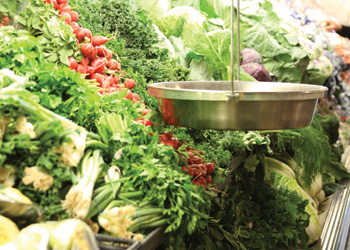Growing the MSU-Kellogg Foundation ‘Good Food’ Partnership
Our goal is to develop a stronger infrastructure for an equitable food system so Michigan’s vulnerable children, families and communities will benefit.
March 11, 2015
The W.K. Kellogg Foundation has awarded two grants to the Michigan State University Center for Regional Food Systems (CRFS) for research and outreach to advance “good food” – food that is healthy, fair, green and affordable – in Michigan. The support totals approximately $6 million over four years. The Michigan Good Food Charter and Farm to School grants will fund work on increasing Michiganders’ access to good food through late 2017 and early 2018, respectively.
“The MSU Center for Regional Food Systems is an important partner for the Kellogg Foundation,” said Linda Jo Doctor, program officer for the W.K. Kellogg Foundation. “Our goal is to develop a stronger infrastructure for an equitable food system so Michigan’s vulnerable children, families and communities will benefit – which could not be accomplished without CRFS’s leadership.”
Farm to Schools
One grant focuses on activities that expand fresh food access, advance local food purchasing and support Michigan farmers.
“This grant provides us the opportunity to expand the role of schools, early childcare and education programs, and other institutions as good food access points,” said Colleen Matts, Farm to Institution specialist at CRFS and lead investigator on the Farm to School grant. “In partnering on Hoophouses for Health, we can help Michigan children, especially the most vulnerable, have better access to good food in their homes, communities and schools.”
Hoophouses for Health is a partnership of CRFS, the Michigan Farmers Market Association and the MSU Department of Horticulture. The program provides vouchers to low-income families with children to purchase locally grown produce at area farmers’ markets. Hoophouses for Health also supports farmers who accept the vouchers by providing them financial and technical assistance to build hoophouses. This extends their growing season and allows them to grow cold-tolerant crops through the winter.
“This is the most exciting thing to happen to us this year,” said Diane Hoye, co-owner of Ohana Gardens in metro Detroit, and a new Hoophouses for Health participating farmer. “Because of the program, there are so many people stopping by and interested in hoophouses. Hoophouses are needed because of the economic conditions in the community; they are breathing new life into Detroit.”
To integrate Hoophouses for Health and Michigan Farm to School efforts, hoophouse growers are encouraged to provide food directly to schools and early childcare and education programs through this grant.
Michigan Good Food Charter
The second grant builds capacity and catalyzes action to implement the goals of the Michigan Good Food Charter. The charter was created in 2010 with input from hundreds across Michigan. Since then, individuals and organizations have worked to implement the charter’s vision to promote equity, sustainability and thriving economies through good food in Michigan.
“The beauty of the Good Food Charter is that it provides a strategic framework that helps us align with other efforts going on across Michigan,” said J.R. Reynolds, Good Food Battle Creek coordinator. “We identified six charter priorities to focus on. Most center on access to good food. Collectively, we’re working to promote equity and sustainability within our community’s food system, which in turn can help drive our economy.”
This grant project fosters and expands existing food-related networks across the state, connecting farmers, processors, retail and institutional buyers, food assistance providers, policymakers and others engaged in advancing good food for all in Michigan. The focus on connecting people and activities paves the way for a shared measurement system that accurately represents the impact of the many good food efforts.
“A key goal of the charter is ’20 percent by 2020,’ meaning that 20 percent of the food consumed in Michigan will come from Michigan producers by 2020,” said Rich Pirog, CRFS senior associate director and lead investigator on the Good Food Charter grant. “This grant will assist us in working with the many organizations and individuals who have signed on to help reach or surpass that 20 percent target, as well as in tracking progress made on the charter goals and better connecting those engaged in good food work across the state.”
The project also builds capacity among new and established food hubs – businesses or organizations that manage the aggregation, distribution and marketing of, typically, local or regional food products – to increase the supply of good food in low-income communities. Technical assistance is provided to food hubs, and the hubs contribute to progress on charter goals to advance access to local foods, options for local sourcing and sustainable farms in Michigan.
Similarly, the Farm to School grant will contribute to Cultivate Michigan, an initiative that centers on the charter goal that Michigan institutions will source 20 percent of their food locally by 2020. Cultivate Michigan is a statewide effort to increase and track local food purchases by institutions (e.g. schools, hospitals and universities) conducted in partnership with the Ecology Center in Ann Arbor. The project is designed to connect people and organizations and contribute to improved understanding of activities across the state to promote good food for all in Michigan.
The W.K. Kellogg Foundation, founded in 1930 as an independent, private foundation by breakfast cereal pioneer Will Keith Kellogg, is among the largest philanthropic foundations in the United States. Guided by the belief that all children should have an equal opportunity to thrive, the foundation works with communities to create conditions that will allow vulnerable children to realize their full potential in school, work and life.
The Kellogg Foundation is based in Battle Creek, Michigan, and works throughout the United States and internationally. Special emphasis is paid to priority places where there are high concentrations of poverty and where children face significant barriers to success. WKKF priority places in the United States are in Michigan, Mississippi, New Mexico and New Orleans; internationally, in Mexico and Haiti. For more information, visit wkkf.org.
At the October 2014 Michigan Good Food Summit, a new public-private partnership loan and grant fund was introduced. The Michigan Good Food Fund will improve the lives of Michigan children and families living in underserved communities throughout the state by expanding access to healthy foods, catalyzing economic development, and creating new permanent jobs. MGFF is a strategic opportunity for philanthropic investors to amplify their investments for greater impact while directly supporting underserved Michigan residents.




